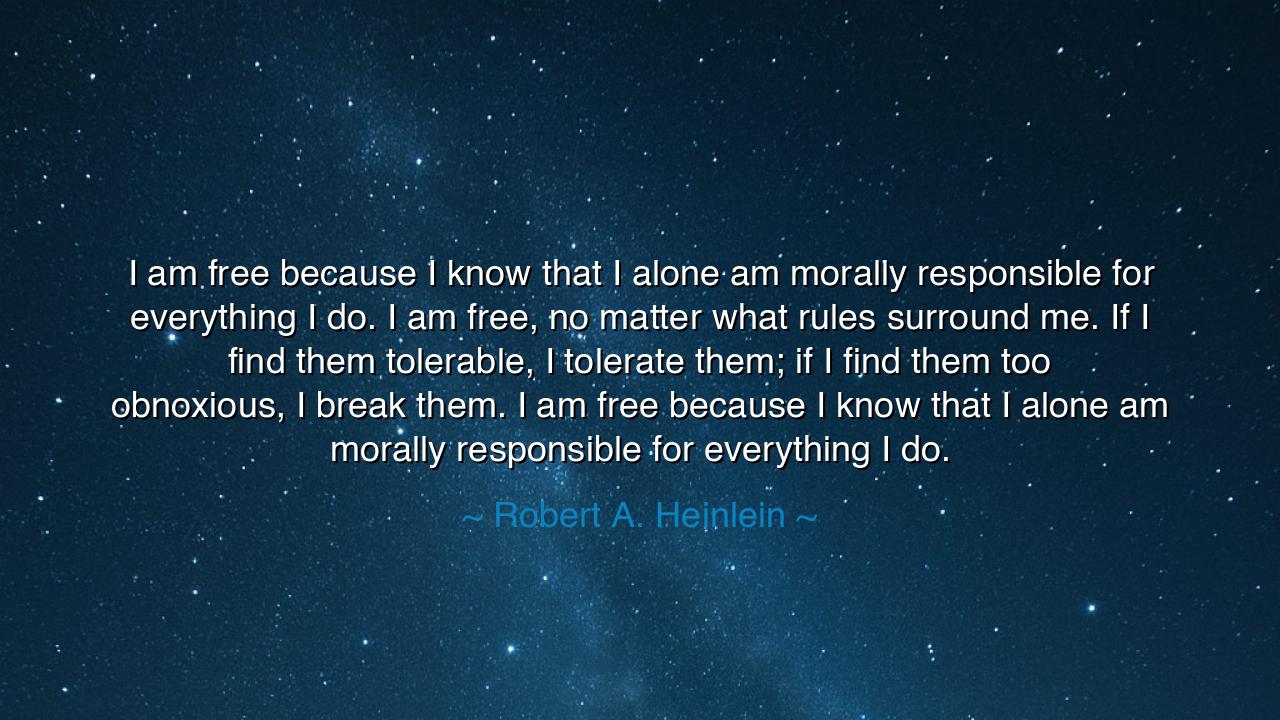
I am free because I know that I alone am morally responsible for
I am free because I know that I alone am morally responsible for everything I do. I am free, no matter what rules surround me. If I find them tolerable, I tolerate them; if I find them too obnoxious, I break them. I am free because I know that I alone am morally responsible for everything I do.






In the wise and bold words of Robert A. Heinlein, “I am free because I know that I alone am morally responsible for everything I do. I am free, no matter what rules surround me. If I find them tolerable, I tolerate them; if I find them too obnoxious, I break them. I am free because I know that I alone am morally responsible for everything I do.” These words cut to the heart of what it means to be truly free—not as a result of external circumstances or the permission of others, but as a product of internal conviction and personal responsibility. Heinlein’s declaration is not a simple call for rebellion against authority, but a profound recognition that true freedom comes when one acknowledges that the only force that can truly govern one’s actions is the self—its beliefs, its values, and its moral compass.
The ancients knew this well. In the time of Socrates, there were laws and rules, just as there are today. Yet Socrates, when faced with the trial that would lead to his death, famously chose to follow his conscience rather than abide by the rules that demanded his submission. He spoke of the importance of a good life, one governed not by the fear of punishment but by the desire to live rightly. Socrates’ commitment to his beliefs, even in the face of death, speaks to Heinlein’s assertion: freedom is not a matter of external conditions but of internal sovereignty, where the individual’s moral responsibility supersedes the law of the land.
Consider the story of Antigone, the ancient heroine from Sophocles’ play. In her world, the king decreed that her brother’s body should be left unburied, yet she defied the rule, choosing to act according to her own moral code. Though she knew the penalty for breaking the king’s law was death, she chose to honor what she believed was the higher law of duty and family. Antigone’s story is one of courageous defiance and moral autonomy, as she, like Heinlein’s quote, embraced responsibility for her actions, knowing that only she could decide what was right for her soul. In this, we see that freedom is not about compliance with the laws of man but about the unyielding commitment to what one knows is just.
In more recent times, we see this same spirit in the life of Mahatma Gandhi. His fight for Indian independence was not simply a political struggle but a deeply personal one. Gandhi chose to follow his conscience, often breaking unjust laws through nonviolent protest. His famous Salt March, in which he defied the British-imposed salt taxes, was not just a political act but a statement of moral freedom. Gandhi’s freedom came not from the absence of laws or from the will of others, but from his deep moral responsibility—his recognition that true freedom is only possible when we act in alignment with our deepest beliefs, regardless of the external consequences.
Heinlein’s words also reflect the inner strength required to choose one’s own path. Freedom does not simply arrive; it is earned through the act of choosing one’s actions and living in accordance with one’s values. The story of Nelson Mandela, imprisoned for decades yet never losing his sense of moral duty, speaks to this idea of freedom. While he was physically incarcerated, his mind and spirit remained unshackled. His commitment to justice, despite the oppressive apartheid laws that surrounded him, was a testament to the true meaning of freedom—being morally responsible for one’s actions, regardless of the external forces attempting to define or limit one’s choices. Mandela, like Heinlein, understood that freedom is a state of the soul, not of the physical world alone.
The lesson from Heinlein’s words is profound and calls us to embrace personal responsibility. It reminds us that freedom is not just a political or external condition, but an internal state of being. When we take ownership of our decisions, recognizing that we alone are responsible for our actions, we achieve a form of freedom that transcends the physical and reaches into the spiritual. True freedom comes from conscious choice and the ability to act with integrity, even when society or the law may encourage us to do otherwise.
In our own lives, we must strive to live with moral clarity and personal responsibility. In the face of external pressures, whether in our relationships, our work, or society at large, let us remember that we are always the ultimate decision-makers in our lives. Freedom comes when we live in harmony with our values, when we embrace the consequences of our actions, and when we hold ourselves accountable for the choices we make. In doing so, we break free from the limitations imposed by others and live fully as sovereigns of our own hearts.
Let us take action: Let us commit to living with moral integrity, guided not by external rules alone but by our inner compass. Let us embrace the freedom that comes from knowing we are the ultimate architects of our lives. By living with authenticity and responsibility, we will shape our destiny, regardless of the forces that may seek to constrain us. Through this, we will not only live freely but also inspire others to do the same, creating a world where individual responsibility and moral courage lead the way.






AAdministratorAdministrator
Welcome, honored guests. Please leave a comment, we will respond soon